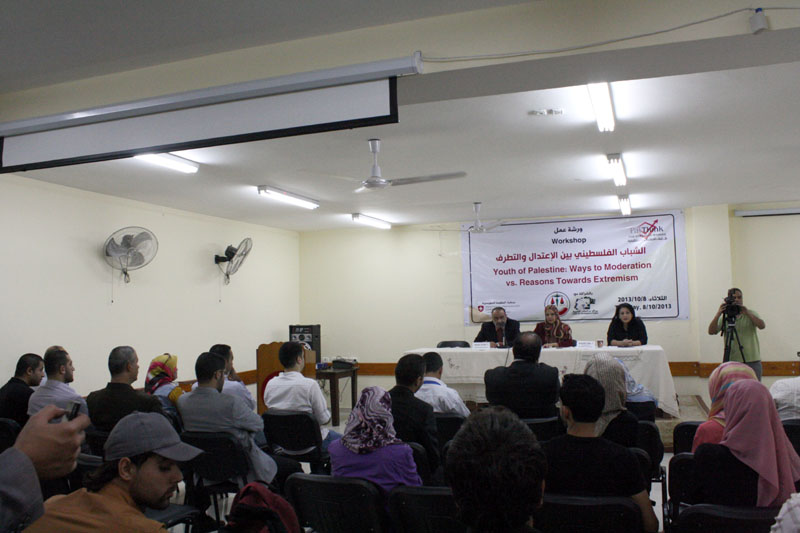Gaza City (October 8, 2013) ― In continuity to create constructive debate around core issues that concerns Palestinian society and the region and in line with its vision to tackle the most sensitive issues , Pal-Think for Strategic Studies organized a workshop on Youth of Palestine: Between Moderation and Extremism.” The workshop was organized in cooperation with the Center for Development Studies and the Palestinian Bar Association, and aimed at bringing attention to the issue of Youth, owing to its high importance and sensitivity in the Palestinian context. The workshop witnessed the attendance of young members of civil society organizations, Palestinian political forces, and young female and male activists who were thrilled to be part of something that concerns them.
The workshop is part of a larger project that aims at providing studies on vital social issues that concern the Palestinian society. Among these social issues, targeting the societal niche of the youth by analyzing and evaluating their situations, in the Gaza Strip in particular, is found to be important and necessary in order to be able to provide solutions and recommendations that aim at improving the conditions of youth as well as the society as a whole.
Pal-think for Strategic Studies realize that youth are the means of change in every society. In the Palestinian Territories in general and Gaza in particular, there is an immense need to create a culture of peace, tolerance and conflict free environment among the youth. Thus, the workshop’s asked: where exactly do our youth stand in society? Pal-Think believes that through the stronger involvement of youth, who demographically represent a significant portion of the population, issues such as extremism, ignorance and violence can be overthrown.
Moreover, the continuation of the conflict with Israel and the crippling blockade over Gaza have rendered life in the Gaza Strip seemingly fruitless thus leaving little in terms of communitarian sentiments or tolerance for others. With the lack of material resources and opportunities leaving Gaza’s frustrated has further meant that more and more of the Strip’s youth have espoused political and religious extremism in lieu of lacking alternatives. These realities then threaten the Palestinian future and therefore need to be dealt with accuracy, in order to deter their impending consequences.
From that stand, and from our growing concerns on this issue, the workshop focused on 3 main issues. Each issue was presented by a guest speaker and included the followings:
1) What are the cultural, political and social rights of youth in the Palestinian territories and how are they being practiced on the ground?
2) Why is extremism present in our society, and mainly among the youth? How can we solve this problem as a family, a civil society organization, or a government?
3) Political participation of youth, has it been noticed? What are the motivations to participate, if any, and what are the obstacles when trying to participate?
In a summary of the workshop, a number of recommendations were released as a contribution and as an effort towards improving the conditions of youth and overcoming the problems that are caused by political problems, the disunity and the blockade in the Gaza Strip
Among the recommendations that were released are the followings:
• It is necessary for Palestinian youth organizations to reorganize themselves so that they can be well prepared for the developments that have occurred in society. With more creativity and professionalism in these organizations, a better result and a greater range of influence can be experienced.
• Youth institutions must reconsider how to activate and use the energies of youth and re-attract them to be part of the political system or public actions.
• Improving the role of civil institutions through reworking their priorities and programs, so it can be in favor of achieving the national interest at first.
• Providing a comfortable and a safe environment for the youth to work and participate without threats or restrictions.
• Strengthening the foundations and principles of the educational system, promote for the culture of accepting our differences, neglect discrimination, respect people’s opinions and ensure that these concepts are being taught to students during their primary stages of education.
• Put an end to the disunity, which has been the feeder for hatred, discrimination and extremism, whether in politics or religion, for the past years.
• Teach families on how to be moderated when dealing with each other. A moderate family will create moderate people, and moderate people will create a moderate society.


